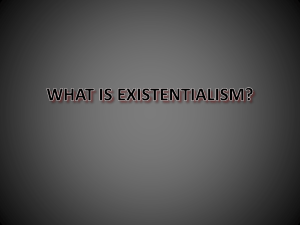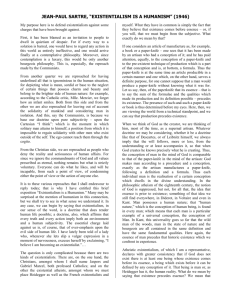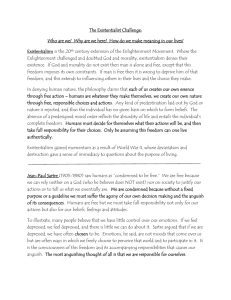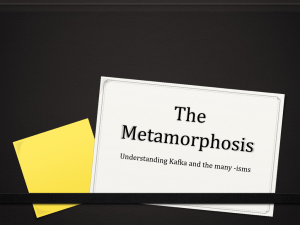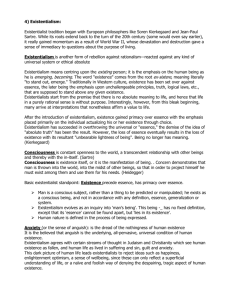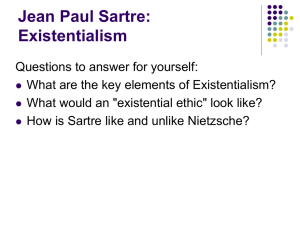From Existentialism is a Humanism - PBworks
advertisement
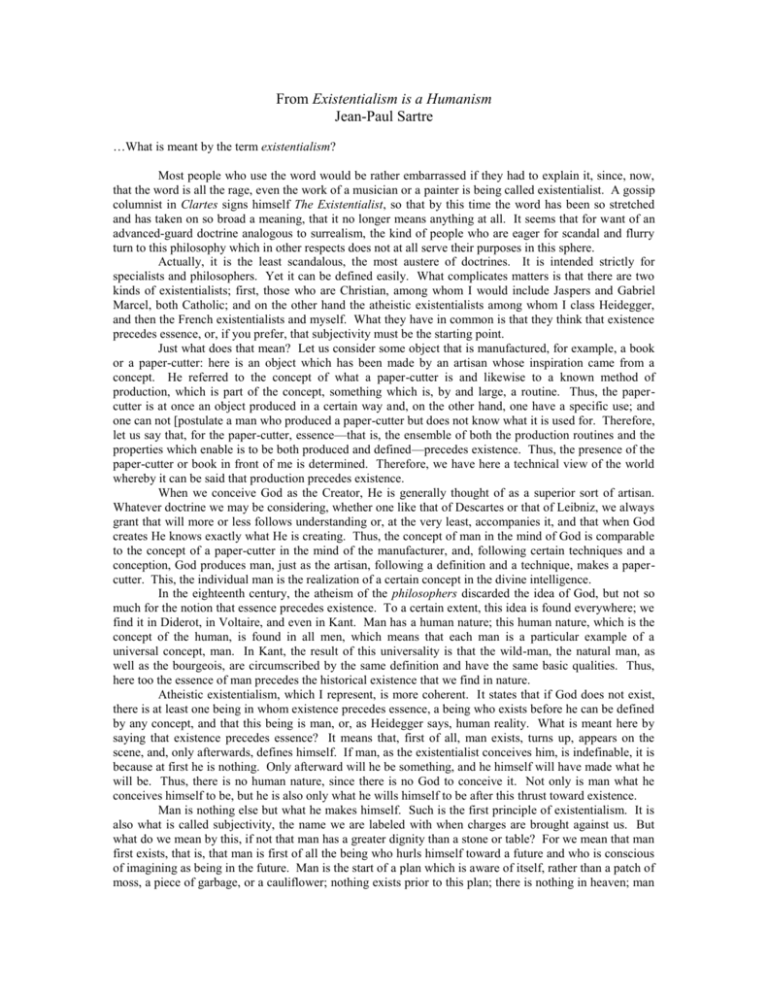
From Existentialism is a Humanism Jean-Paul Sartre …What is meant by the term existentialism? Most people who use the word would be rather embarrassed if they had to explain it, since, now, that the word is all the rage, even the work of a musician or a painter is being called existentialist. A gossip columnist in Clartes signs himself The Existentialist, so that by this time the word has been so stretched and has taken on so broad a meaning, that it no longer means anything at all. It seems that for want of an advanced-guard doctrine analogous to surrealism, the kind of people who are eager for scandal and flurry turn to this philosophy which in other respects does not at all serve their purposes in this sphere. Actually, it is the least scandalous, the most austere of doctrines. It is intended strictly for specialists and philosophers. Yet it can be defined easily. What complicates matters is that there are two kinds of existentialists; first, those who are Christian, among whom I would include Jaspers and Gabriel Marcel, both Catholic; and on the other hand the atheistic existentialists among whom I class Heidegger, and then the French existentialists and myself. What they have in common is that they think that existence precedes essence, or, if you prefer, that subjectivity must be the starting point. Just what does that mean? Let us consider some object that is manufactured, for example, a book or a paper-cutter: here is an object which has been made by an artisan whose inspiration came from a concept. He referred to the concept of what a paper-cutter is and likewise to a known method of production, which is part of the concept, something which is, by and large, a routine. Thus, the papercutter is at once an object produced in a certain way and, on the other hand, one have a specific use; and one can not [postulate a man who produced a paper-cutter but does not know what it is used for. Therefore, let us say that, for the paper-cutter, essence—that is, the ensemble of both the production routines and the properties which enable is to be both produced and defined—precedes existence. Thus, the presence of the paper-cutter or book in front of me is determined. Therefore, we have here a technical view of the world whereby it can be said that production precedes existence. When we conceive God as the Creator, He is generally thought of as a superior sort of artisan. Whatever doctrine we may be considering, whether one like that of Descartes or that of Leibniz, we always grant that will more or less follows understanding or, at the very least, accompanies it, and that when God creates He knows exactly what He is creating. Thus, the concept of man in the mind of God is comparable to the concept of a paper-cutter in the mind of the manufacturer, and, following certain techniques and a conception, God produces man, just as the artisan, following a definition and a technique, makes a papercutter. This, the individual man is the realization of a certain concept in the divine intelligence. In the eighteenth century, the atheism of the philosophers discarded the idea of God, but not so much for the notion that essence precedes existence. To a certain extent, this idea is found everywhere; we find it in Diderot, in Voltaire, and even in Kant. Man has a human nature; this human nature, which is the concept of the human, is found in all men, which means that each man is a particular example of a universal concept, man. In Kant, the result of this universality is that the wild-man, the natural man, as well as the bourgeois, are circumscribed by the same definition and have the same basic qualities. Thus, here too the essence of man precedes the historical existence that we find in nature. Atheistic existentialism, which I represent, is more coherent. It states that if God does not exist, there is at least one being in whom existence precedes essence, a being who exists before he can be defined by any concept, and that this being is man, or, as Heidegger says, human reality. What is meant here by saying that existence precedes essence? It means that, first of all, man exists, turns up, appears on the scene, and, only afterwards, defines himself. If man, as the existentialist conceives him, is indefinable, it is because at first he is nothing. Only afterward will he be something, and he himself will have made what he will be. Thus, there is no human nature, since there is no God to conceive it. Not only is man what he conceives himself to be, but he is also only what he wills himself to be after this thrust toward existence. Man is nothing else but what he makes himself. Such is the first principle of existentialism. It is also what is called subjectivity, the name we are labeled with when charges are brought against us. But what do we mean by this, if not that man has a greater dignity than a stone or table? For we mean that man first exists, that is, that man is first of all the being who hurls himself toward a future and who is conscious of imagining as being in the future. Man is the start of a plan which is aware of itself, rather than a patch of moss, a piece of garbage, or a cauliflower; nothing exists prior to this plan; there is nothing in heaven; man will be what he will have planned to be. Not what he will want to be. Because by the word “will” we generally mean a conscious decision, which is subsequent to what we have already made of ourselves. I may want to belong to a political party, write a book, get married; but all that is only a manifestation of an earlier, more spontaneous choice that is called “will.” But if existence really does precede essence, than man is responsible for what he is. Thus, existentialism’s first move is to make every man aware of what he is and to make the full responsibility of his existence rest on him. And when we say that a man is responsible for himself, we do not mean that he is responsible his own individuality, but that he is responsible for all men. The word subjectivism has two meanings, and our opponents play on the two. Subjectivism mean, on the one hand, that an individual chooses and makes himself; and, on the other, that it is impossible for man to transcend human subjectivity. The second of these is the essential meaning of existentialism. When we say that man chooses his own self, we mean that every one of us does likewise; but we also mean by that that in making this choice he also chooses all men. In fact, in creating the man that we want to be, there is not a single one of our acts which does not at the same time create an image of man as we think he ought to be. To choose to be this or that is to affirm at the same time the value of what we choose, because we can never choose evil. We always choose the good, and nothing can be good for us without being good for all. If, on the other hand, existence precedes essence, and if we grant that we exist and fashion our image at one and the same time, the image is valid for everybody and for our whole age. Thus, our responsibility is much greater than we might have supposed, because it involves all mankind. If I am a working man and choose to join a Christian trade-union rather than be a communist, and if by being a member I want to show that the best thing for man is resignation, that the kingdom of man is not of this world, I am not only involving my own case—I want to be resigned for everyone. As a result, my action has involved all humanity. To take a more individual matter, if I want to marry, to have children; even if this marriage depends solely on my own circumstances or passion or wish, I am involving all humanity in monogamy and not merely myself. I am creating a certain image of man of my own choosing. In choosing myself, I choose man…. If existence really does precede essence, there is no explaining things away by reference to a fixed and given human nature. In other words, there is no determinism, man is free, man is freedom. On the other hand, if God does not exist, we find no values or commands to turn to which legitimize our conduct. So, in the bright realm of values, we have no excuse behind us, nor justification before us. We are alone, with no excuses. That is the idea I shall try to convey when I say that man is condemned to be free. Condemned, because he did not create himself, yet, in other respects is free; because, once thrown into the world, he is responsible for everything he does. The existentialist does not believe in the power of passion. He will never agree that a sweeping passion is a ravaging torrent which fatally leads a man to certain acts and is therefore an excuse. He thinks that man is responsible for his passion…. “After all, these people are so spineless, how are you going to make heroes out of them?” This objection almost makes me laugh, for it assumes that people are born heroes. That’s what people really want to think. If you’re born cowardly, you may set your mind perfectly at rest; there’s nothing you can do about it; you will be cowardly all your life, whatever you may do. If you’re born a hero, you may set your mind just as much at rest; you’ll be a hero all your life; you’ll drink like a hero and eat like a hero. What the existentialist says is that the hero makes himself heroic. There’s always a possibility for the coward not to be cowardly any more and for the hero to stop being heroic. What counts is total involvement; some one particular action or set of circumstances is not total involvement…. …If it is impossible to find in every man some universal essence which would be human nature, yet there does exist a universal human condition. It’s not by chance that today’s thinkers speak more readily of man’s condition than of his nature. By condition they mean, more or less definitely, the a priori limits which outline man’s fundamental situation in the universe. Historical situations vary; a man may be born a slave in a pagan society or a feudal lord or a proletarian. What does not vary is the necessity for him to exist in the world, to be at work there, to be there in the midst of other people, and to be mortal there. The limits are neither subjective nor objective, or, rather, they have as objective and subjective side. Objective because they are to be found everywhere and are recognizable everywhere; subjective because they are lived and are nothing if man does not live them, that is, freely determine his existence with reference to them. And though the configurations may differ, at least none of them are completely strange to me, because they all appear as attempts either to pass beyond these limits or recede from them or deny them or adapt to them. Consequently, every configuration, however individual it may be, has a universal value…. In this sense we may say that there is a universality of man; but it is not given, it is perpetually being made. I build the universal in choosing myself; I build it in understanding the configuration of every other man, whatever age he might have lived in. This absoluteness of choice does not do away with the relativeness of each epoch. At heart, what existentialism shows is the connection between absolute character of free involvement, by virtue of which every man realizes himself in realizing a type of mankind, an involvement always comprehensible in any age whatsoever and by any person whosoever, and the relativeness of the cultural ensemble which may result from such a choice; it must be stressed that the relativity of Cartesianism and the absolute character of Cartesian involvement go together. In this sense, you may, if you like, say that each of us performs an absolute act in breathing, eating, sleeping, or behaving in any way whatever. There is no difference between being free, like a configuration, like an existence which chooses its essence, and being absolute. There is no difference between being an absolute temporarily localized, that is, localized in history, and being universally comprehensible. Sartre, Jean-Paul. “The Humanism of Existentialism: Man as maker of himself.” Western Heritage: Man’s Encounter with Himself and the World. Ed. Francis R. Gendreau and Angelo Caranfa. Lanham: UP of America, 1984: 323-28.
